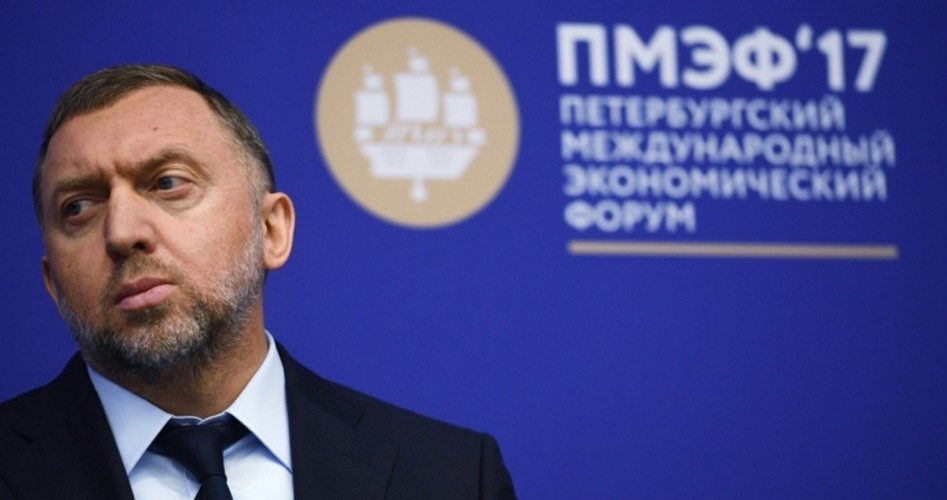
Former Trump presidential campaign manager Paul Manafort sent an e-mail on July 7, 2016, intended for Russian aluminum magnate Oleg Deripaska (shown), offering to provide private briefings on the presidential race. The e-mails were sent to an overseas intermediary with a request to forward them to Deripaska. “If he needs private briefings we can accommodate,” Manafort wrote in the e-mail, portions of which were read to the Washington Post, which broke this story. As we shall discuss later, however, Special Counsel Robert Mueller does not seem to be sufficiently objective to lead the investigation into Manafort’s activities.
The Post reported that the e-mails are among tens of thousands of documents that have been turned over to congressional investigators and special counsel Robert Mueller III’s team that is investigating whether members of the Trump campaign cooperated with Russians they suspect tried to interfere in the 2016 presidential election.
However, notes the report, there is no evidence in the documents showing that Deripaska received Manafort’s offer or that any briefings took place. The Post also quoted a spokeswoman for Deripaska who dismissed the e-mail exchanges as scheming by “consultants in the notorious ‘beltway bandit’ industry.”
The New American reported in an August 9 article that during the early morning hours of July 26, FBI agents raided Manafort’s Alexandria, Virginia home.
The article reported:
The agents were executing a warrant obtained by Special Counsel Robert Mueller, as part of his probe into the alleged interference by the Russian government in last year’s presidential campaign. Manafort has been under investigation by the FBI since 2014 for his work on behalf of the Party of Regions of former Ukrainian President Viktor Yanukovych, a close ally of the Russians.
The article noted that Mueller has put together an army of 16 lawyers in his probe, and has empaneled a grand jury that can issue subpoenas for business and financial records.
The author of the article, Steve Byas, raised some interesting points about Mueller’s investigation into Manafort’s activities and how most of the media has reported (or not reported) potential legal conflicts within both the Trump and Clinton campaigns last year.
The article observed that the mainstream media rarely paused in publishing insinuations that the Trump campaign colluded with the Russian government in their alleged “hacking” into Democratic e-mails. But they have said little about similar violations committed by the Democrats.
Byas wrote:
For example, one e-mail released by WikiLeaks in the files of John Podesta, Clinton’s campaign manager, provided proof that Democrat Party leader Donna Brazile was actually informing the Clinton campaign as to what questions she would be asked in the presidential debates with Trump. According to the Roger Stone in his book The Making of the President 2016, Brazile told Podesta, “One of the questions directed to HRC [Hillary Rodham Clinton] tomorrow is from a woman with a rash.” Brazile gave Podesta details to pass on to Clinton: “Her family has lead poisoning and she will ask what, if anything, will Hillary do as president to help the [people] of Flint [Michigan].”
Byas asked: “Can one imagine the media interest if it was discovered that a Republican nominee had been fed a question prior to a debate on the Fox News Network?”
The article went on to say:
Mueller evidently believes that Manafort used his connections with the Russians to hack into the computers at the DNC and the Clinton campaign to defeat her. With a huge budget and staff, the backing of the American media, the Democratic Party, and even some Establishment Republicans, it appears he has many people who he hopes can find something criminal to topple President Trump.
A troubling aspect of Mueller’s position in the driver’s seat of the investigation into Manafort (which some enemies of the Trump administration hope will result in a reprise of the Watergate scandal that brought down the presidency of Richard Nixon in the early 1970s) is that Mueller’s credibility and objectivity to lead the investigation should be questioned
An August 2 article posted by The New American, also by Byas, drew from information released by Julian Assange at WikiLeaks of a 2009 State Department cable to the Russians. The cable was released by Assange on May 17, the same day that Deputy Attorney General Rod Rosenstein tapped Mueller as an “independent” counsel to investigate any supposed Trump-Russian ties. The cable indicated:
In 2009, then-Secretary of State Hillary Clinton directed FBI Director Mueller to deliver a sample of Highly Enriched Uranium (HEU) to Russia. The uranium had reportedly been stolen. It seems particularly odd, considering that the FBI is not under the supervision of the State Department, and that the FBI director would personally make the transfer. (Italics in original.)
As was further revealed by WikiLeaks, Clinton sent a cable to U.S. Ambassador to Russia John Beryle on August 17, 2009. The cable read in part, “Action Request: Embassy Moscow is requested to alert at the highest appropriate level the Russian Federation that FBI Director Mueller plans to deliver the HEU sample once he arrives in Moscow on September 21.”
Byas continued by observing:
While the revelation of a secret meeting involving Robert Mueller in the delivery of uranium to the Russians, by itself, does not prove anything of a criminal or unethical nature, it does raise questions that merit an investigation. After all, when Mueller was FBI director under the Obama administration, he was trusted enough by Secretary of State Hillary Clinton to carry out this mission. If it was a diplomatic mission, why was the FBI director involved? And if it was a law enforcement mission, why was Clinton involved?
And is Mueller sufficiently objective to conduct an impartial investigation of a Republican president?
To Byas’s questioning of Mueller’s objectivity we might add our own question of his credibility, based on his actions while still FBI director. As we noted in our article of September 14:
When a Senate committee sent investigators to question an FBI informant who had been in association with two 9/11 hijackers, then-FBI director Robert Mueller objected.
A team of investigators led by former FBI lawyer and counterterrorism analyst Michael Jacobson went to San Diego to investigate the connection between the Saudi government and the activities of some of the hijackers in that city. Jacobson and his team wanted to meet with an FBI informant named Abdussattar Shaikh, who had been in close association with two hijackers — Nawaf al-Hazmi and Khalid al-Mihdhar, both of whom were on American Airlines flight 77, which crashed into the Pentagon. But the investigators were unsuccessful in meeting with Shaikh.
Journalist Andrew Cockburn wrote in an article for Harper’s that provided an incredible explanation for the failure of this investigation:
Understandably, the investigators had a lot of questions for this man. Nevertheless, Mueller adamantly refused their demands to interview him, even when backed by a congressional subpoena, and removed Shaikh to an undisclosed location “for his own safety.” Today, [former Florida Governor and Senator Bob] Graham believes that Mueller was acting under orders from the [George W. Bush] White House.
In an article posted by Antiwar.com on September 11, Justin Raimondo posed the question: “Was Mueller, possibly on orders from President George W. Bush, colluding with the Saudis to cover up their role?”
In view of Mueller’s role in taking part in a highly suspicious delivery of uranium to the Russians and also interfering with an investigation into Saudi involvement in the 9/11 terrorist attacks, he hardly seems to be the individual of unimpeachable character who should be leading an investigation into Trump’s campaign manager.
As the old saying goes: “People who live in glass houses shouldn’t throw stones.”
Photo of Oleg Deripaska: AP Images
Related articles:
Trump Campaign Mgr. Manafort’s Virginia Residence Raided by FBI
Mueller’s Role in Delivering Uranium to Russians Raises Questions
Former FBI Director Mueller Obstructed Congressional Investigation into Saudi Involvement in 9/11



